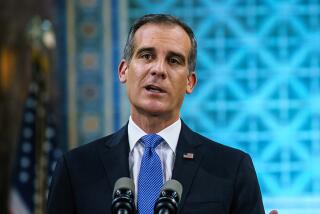Senate Raps Rampant Fraud in Filipino Vote
- Share via
WASHINGTON — The Senate today overwhelmingly declared that the Philippine presidential election had been “marked by such widespread fraud that it cannot be considered a fair reflection of the will of the people of the Philippines.”
The 85-9 vote on the non-binding resolution came shortly after Democratic leader Robert C. Byrd asked President Reagan to personally convey to President Ferdinand E. Marcos American concerns over fraud in the Feb. 7 election.
“The President himself . . . should get on the telephone and find some way to make a direct contact with Marcos,” Byrd told reporters.
He added that Democratic senators were drafting a letter to Reagan formally making that request.
Base Pullout Hinted
Elsewhere on Capitol Hill, Secretary of State George P. Shultz told the Senate Budget Committee: “Let’s put our stake in democracy and freedom above the bases.”
He appeared to be hinting that the Administration would consider withdrawing from Clark Air Base and the Subic Bay Navy Base--the two largest U.S. bases overseas--if it finds Marcos won reelection through fraud and no longer has the support of the people in his country.
The Senate resolution, sponsored chiefly by Byrd and Majority Leader Bob Dole (R-Kan.), said the Philippine balloting “was plagued by widespread fraud on all levels.” It adds that “America’s interests are best served in the Philippines by a government which has a popular mandate.”
Opposing Senators
The only senators voting against the resolution were Jeremiah Denton (R-Ala.), John P. East (R-N.C.), Barry Goldwater (R-Ariz.), Chic Hecht (R-Nev.), Jesse Helms (R-N.C.), John Melcher (D-Mont.), Steven D. Symms (R-Ida.), Strom Thurmond (R-S.C.) and Malcolm Wallop (R-Wyo.). Sen. Howell Heflin (D-Ala.) voted present.
Before the vote, Sen. Richard G. Lugar (R-Ind.), who was co-chairman of a delegation of U.S. observers at the elections, told his colleagues that the group had witnessed widespread fraud.
More to Read
Get the L.A. Times Politics newsletter
Deeply reported insights into legislation, politics and policy from Sacramento, Washington and beyond. In your inbox twice per week.
You may occasionally receive promotional content from the Los Angeles Times.










